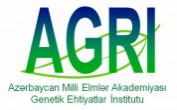
As of January 2016, international webinars (seminars via the internet) were for the first time organised in Azerbaijan at the Genetic Resources Institute (GRI) of the Azerbaijan National Academy of Sciences (ANAS) by initiative of a director of the laboratory on Bioinformatics of the Institute of Molecular Biology and Biotechnology of ANAS (IMBB), and professor of the Azerbaijan State Medical University (ASMU) presently holding scientific researchers at the King Abdullah University of Science & Technology in Saudi Arabia, corresponding member of ANAS, doctor in science in Biology Ilham Shakhmuradov and by full support of leadership of the Genetic Resources Institute.
Researchers from the GRI, Bioinformatics laboratory of the IMBB, Chair of Medical Biology and Genetics of ASMU and National Oncology Centre participate in the regularly held webinars. It must be specially noted that among participants of the seminars held via the internet young researchers make a majority and researchers from the USA, Germany, Australia, Turkey, Pakistan, Saudi Arabia and other countries will join them in near future.
The main goal in organising these webinars is to share and discuss information on latest achievements in Biology, Medicine and Agriculture, to form new scientific ideas and projects on their basis, to expand and deepen the scientific cooperation relations between researchers of ANAS, universities and other scientific research centres, to achieve more efficient and wider use of the scientific equipment obtained from the Science Development Fund under the President of Azerbaijan Republic, ANAS and other sources, to gain opportunities of scientific cooperation for Azerbaijani scholars (especially young ones) through contacts with leading researchers from other countries, to enhance experience of young researchers in making reports at scientific seminars, to form the culture of scientific discussion in them and to create new opportunities for young scholars and specialists, masters and doctoral students to master deeper knowledge on the most modern directions of science and develop skills of the researcher.
The first 5 webinars focused on reports and detailed discussions of topics presented by I.Shakhmuradov as follows:
“Introduction into Bioinformatics” (22 January 2016),
“The line of succession: goals and means” (12 February 2016),
“Comparison of nucleotide and proteins sequence, and interpretation of obtained results” (19 February 2016),
“The problem of genoms annotation, and practical and bioinfomatic resources for their resolution” (26 February, 4 March 2016) and
“Genetical outlook at the human being: genoms and repeated annotation, genoms heredity” (11 March 2016).
Additionally, a Turkish researcher of Advanced Genomics and Bioinformatics Research Centre (İGBAM) Dr. Huseyn Demirchi made on 31 March 2016 a report on the main research directions and successes of the Centre, as well as on the ‘exome sequencing’. The future cooperation prospects between GRI and IGBAMwere discussed.
Senior scientific researcher of the Department on Biotechnology of the GRI, doctor of philosophy in Biology Saida Sharifova made a report entitled “Transcriptomics, research methods and applications spheres” on 1 April 2016.
The reporter provided detailed information about ‘transcriptomics’ and its research methods, opportunities of use in the research of human and plant genomes. It was followed by question and answer session, and wide discussions.
Chief lecturer of the ASMU, doctoral student of the GRI, doctor of philosophy in Biology Leyla Suleymanova made an address on the topic “World of non-coding RNA” on 8 February 2016.
The report provided detailed information about small and long non-coding RNAs, their function and methods of identification. It was followed by discussions around the report and questions.
Holding of webinars will be continued further. It must be especially noted that regardless of the organisation, every researcher and student can participate in webinars. Joining of scholars working in other countries will soon create opportunities for mutual benefit from such scientific discussions.